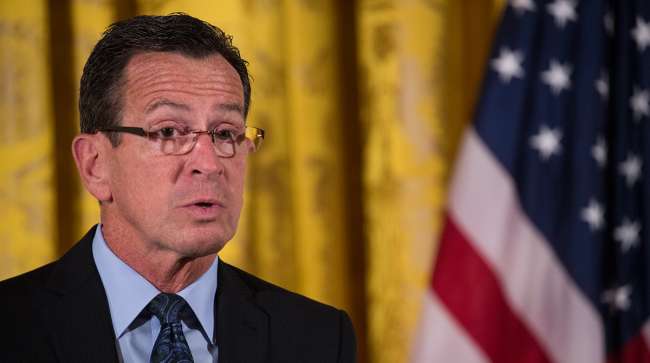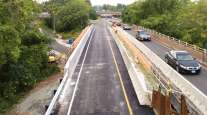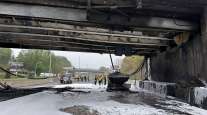Connecticut’s Governor Promotes State’s Transportation Lockbox

Connecticut’s Heroes Tunnel, the 68-year-old engineering feat carved through West Rock, was the backdrop, but the issue was the transportation lockbox, a constitutional amendment that is headed to voters in 2018.
Traffic periodically slowed July 5 near the tunnel on the Wilbur Cross Parkway demonstrating how it easily becomes a bottleneck as Gov. Dannel Malloy and other officials talked up his infrastructure plans and the way to conserve funds to pay for them.
The preferred fix for the $200 million tunnel upgrade is construction of a third tunnel to speed repairs and offer an alternative for emergencies.
Malloy said the funds for the design work are in place with a 2019 completion date for that portion of the work and construction starting in 2021.
The governor, who is not seeking re-election in 2018, talked up the lockbox concept approved in both the state Senate and House as the only guarantee that transportation funds will be set aside and protected for future use by his successor.
Malloy has refused to approve additional revenue streams for transportation until a constitutional lockbox is in place.
Over the years, lawmakers have diverted transportation funds to fill other needs, even as the state’s roads and bridges continued to deteriorate and revenue from the gas tax continued to drop.
Malloy said that on average, 71,000 cars come through the tunnels daily, a piece of infrastructure that has not been overhauled since it was built in 1949.
The governor said the tunnel suffers from substandard shoulder width — which is problematic for emergency vehicles — while it also does not meet standards for current electrical, fire and mechanical protection systems. Repairs also require partial tunnel closures, he said.
“Without action, we risk turning the four-lane parkway into a two-lane parkway that will create significant traffic headaches harming residences and businesses in the area,” Malloy said.
It is one of many projects in construction or under design as part of Malloy’s ambitious 30-year Let’s Go CT transportation infrastructure investment plan. The governor said businesses and residents across the state have spoken up about the need for road and bridge improvements if the state is going to attract more jobs.
He said the problem is due to inaction for decades in the state.
“We need to upgrade our transportation network in order to be competitive with surrounding states,” he said.
Malloy said that if we continue to invest in transportation, residents have to be guaranteed that the money deposited into the fund will only be used for transportation projects and can’t be raided by future governors and legislators.
State Senate Majority Leader Bob Duff, (D-Norwalk) said the economy will not grow without any investment in infrastructure.
The governor said 47% of state-maintained roads are in “less than good condition.” He said if funding remains constant, that percentage increases to 71% in 30 years. The state also has 252 bridges rated as “structurally deficient,” which is down from 331 when Malloy first took office.
“The reality is we have a long, long way to go to make sure that our bridges are meeting appropriate standards,” he said.
On the New Haven Rail Line, the busiest commuter line in the country, the governor said 76% of all rail bridges were built before 1940 and four of those bridges are more than a century old.
Malloy told the crowd of state Department of Transportation and construction workers that traffic congestion costs Connecticut $5 billion a year in lost productivity.
“Business leaders rank highway accessibility as the number one factor in deciding where to locate their business,” he said.
State Rep. Tony Guerrera (D-Rocky Hill), chairman of the Legislature’s Transportation Committee, said Connecticut needs infrastructure that moves goods and services in the fastest amount of time.
Guerrera is among those also supporting electronic tolls to augment transportation funds, which are drying up as the needs increase.
Don Shubert, who represents the construction industry, said the lockbox is an important piece of legislation for every resident and he urged voters to get behind it.
Malloy was asked whether he hoped this will reignite the discussion around tolls as a revenue stream.
“We need income. That is the reality. Where that income comes from I think is a discussion that people have to have. But to pretend that we can modernize our transportation system in a time when revenues are falling … it just doesn’t make sense. Our state bird is not the ostrich. We should take our head out of the sand and be having a discussion about how we raise the appropriate amounts of money to maintain our roads,” the governor said.
Distributed by Tribune Content Agency, LLC




